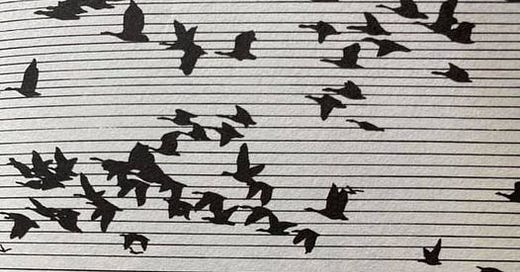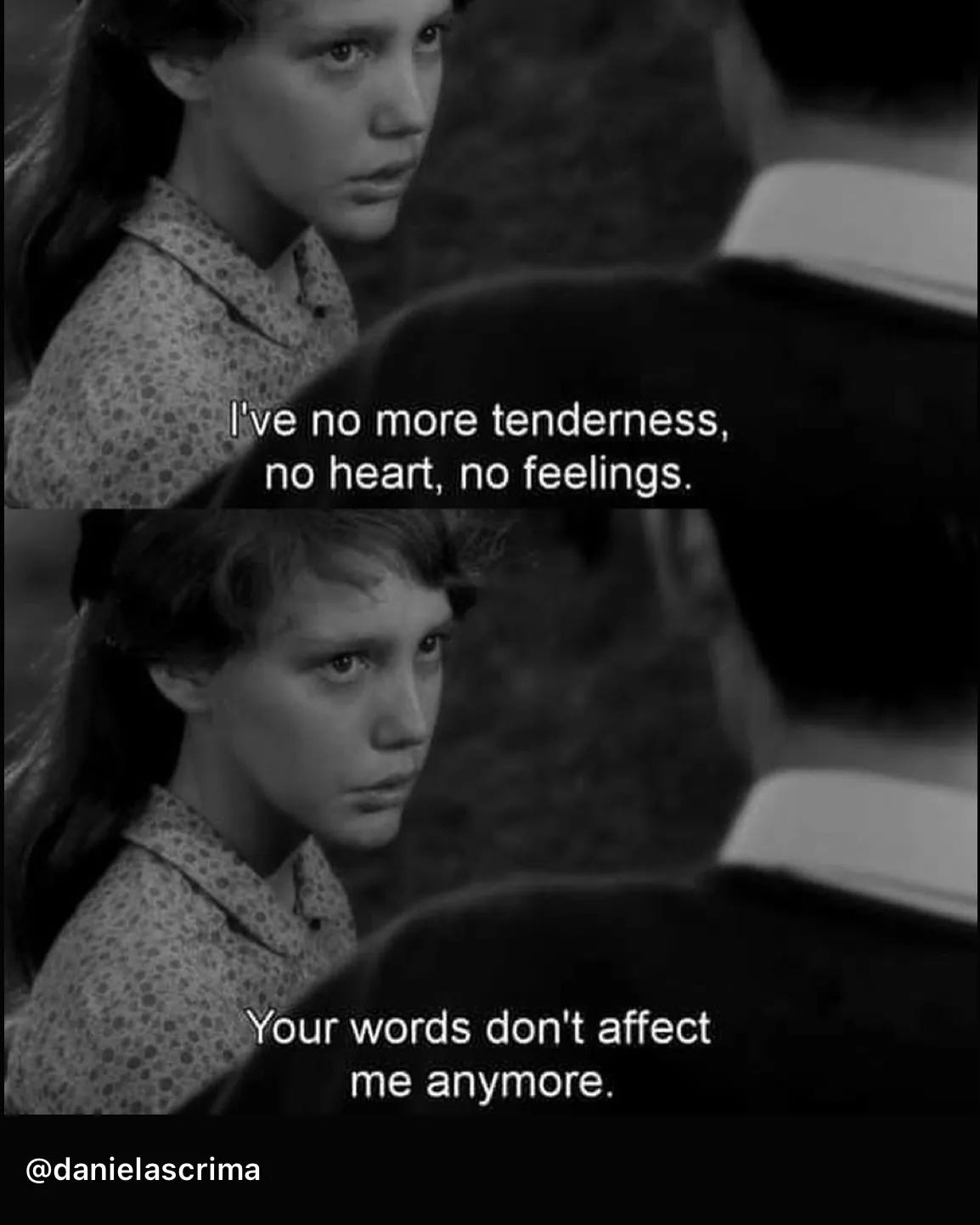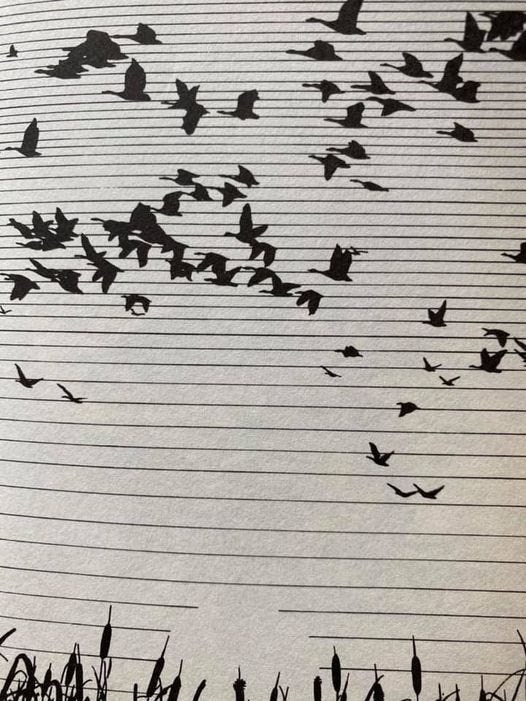My Soft Animal
From Falling in Love at Olive Garden to Chasing Mary Oliver's Geese; Or, Two Poems on Desire and Other Undoings
Dear beautiful people,
Please indulge me in opening with another cautionary tale from my inventory of bad romance, the college years: Once, a duplicitous boyfriend faked feminism (if I’m being honest, ineptly) for eight months before dumping me at the same time as announcing his move to China. Unbeknownst to me, he was taking off to pursue the white man’s burden of his decidedly colonialist brand of misogyny. Post-breakup, I remember how my mouth dropped and chest pounded while sitting at my desk, which is to say, a flimsy foldout table often used at garage sales or community events, registering the horror of seeing a Facebook album in which he staged each photo with his arm around a different woman. He beams into the camera with that unsettling grin of corporate lawyers and Harvard graduates, more display of expensive teeth than smile. To be clear, my response was not jealousy but an all too familiar rage. I can’t remember the name of the album or what the captions read exactly, but it was unequivocal in its, in this case Orientalist, positioning of women as sexual objects and ego props. His last words to me, before requesting a ride to LAX, were: “The only reason anyone would ever want to be close to you is to fuck you.”
I did not drive him to the airport.
Instead, I ran through the streets of LA, to my credit, wearing jogging shoes lest you think I’m describing incredulous me through metaphor, until my favorite donut/boba shop at the intersection of York and Eagle Rock Boulevard opened at dawn. Its neon sign faintly shone “Donut” next to a solid red unlit S—the permanently unlit plural, the reductive violence or absurdity of the singular. I wondered if the letter would ever get fixed, if my fucked up little bisexual heart ever could be.
I hate to admit how much my ex’s abrupt goodbye stuck with me. Despite my disdain for the pathetic man who offered this parting gift, the core of my ex’s argument reappears in recent ruminations on feeling desired but not loved. This is not the faint trace of memory’s palimpsest but the direct transference of trauma. In psychoanalytic terms, it would seem that the loss exists in my body in its obscene wholeness, threatening self-coherence, unable to be broken up into digestible parts. Freud’s “Mourning and Melancholia” (1917) has been complicated in important ways, particularly by scholars attending to the social hierarchies and power imbalances immanent in the distinction. Nonetheless, in this Freudian schema I would be the melancholic, unable to properly mourn and so to resolve the originary trauma, which, of course, was not the words of my college boyfriend but the formative experiences that predisposed me to believe them.
From that space of fury and heartbreak, disavowing my ex but internalizing his words, as if each step further cemented them into my brain, I alternately sprinted, walked, and jogged from nightfall to sunrise. To this day I don’t understand how my body sustained so many miles without total collapse. How my body kept fighting for more love, bigger desires, despite the woundings each imprinted on me. Except, my body’s forward momentum remains undeterred, sometimes in spite of myself.
As I expand on themes from my last public post, “Love in the Time of Stripping,” I have been listening to Chappell Roan and revisiting old poems, both of which make me nostalgic for the incandescent desires of my youth, replete with maudlin happily-ever-after fantasies as well as the destructive drives often attending those fantasies. The passion with which I pursued romance just a few years ago feels like another affective lifetime.
As a former English professor who started stripping as a way out of an academic department that publicly vilified and harassed survivors, my orientation toward desire these days feels heavy with the trajectory of that grief—from the backlash and retaliation I faced for speaking out against the abhorrent actions of Blake Bailey in the presence of his friends and self-interested apologists despite numerous reports of sexual harassment and assault at Old Dominion University (ODU) and elsewhere, to the knowledge that what were previously hopeful fantasies have been devalued to scripted performance for pay.
Lately I feel haunted by a nightmare in which I want to pursue genuine or “true” love but I’m trapped within the confines of a reality TV set, unwittingly cast in a heteronormative dating experiment, like the stripper version of Jim Carrey in The Truman Show. And all the contestants are either Philip Roth’s biographer, or the vile professor at ODU against whom I filed a Title IX complaint, or men who eerily resemble my father, or this asshole (cues video of Sam M. on the current season of The Bachelorette).
I want to be clear that I don’t think of romance as exclusively tied to sexual relationships, much less men, and the second part of “Love in the Time of Stripping” addresses how much I cherish queer friendships in particular, alongside how sex work and academia have shaped my relationships (and the power dynamics embedded in them) more generally.
Today, though, I want to share two poems. The first, “Mammal,” I wrote during my prolonged slut era, back when I sustained a desire for sexual connection while cleaving to a potent belief in the kind of romance existent only in the fantastical dissembling of a Disney movie. This era—rife with messy missteps—also confronted me with my fraught relationship to pleasure and intoxication. After evaluating and reevaluating, I recently landed on principled moderation over total abstention, a moderation made possible by hard-won self-trust against the traumatized impulse of self-abandonment. But I have a harder time navigating the conflicting desire to sink into or stave off love’s conflagration. The second poem, “My Soft Animal,” attempts to grapple with love’s aftermath, how it undoes us.
Since “Mammal” was published by Screen Door Review: Literary Voices of the Queer South, when I still lived in Richmond, Virginia prior to my resignation, I’m not putting it behind a paywall. Instead, I am choosing to share the newer, rawer poem with my paid subscribers. “My Soft Animal” was inspired by and makes reference to Mary Oliver’s poem “Wild Geese,” which I recommend reading, or rereading, often. (I also adore this drawing by Douglas Wood that accompanies the poem on the linked page.)
In this moment of uncertainty around if or when or how to pursue dating, and in excavating the affective contours of desire, from my slut era to my decidedly unslutty stripper era,1 Oliver’s words console me:
You do not have to be good. You do not have to walk on your knees For a hundred miles in the desert, repenting. You only have to let the soft animal of your body Love what it loves.
The poem ends with an incantation to embrace the exhilarating uncertainties of the imagination, the excitement of possibility. To remember that the world’s momentum—not your plans for it, but your adjustment to its changing rhythms—will be the guide, to quote Oliver again: “Over and over announcing your place/ In the family of things.”
If you would like to read the below unpublished poem from my memoir, please consider a paid subscription or, as always, message me for free access!
xx,
Alison
p.s. The formatting of “Mammal” was wonky despite Substack’s poetry feature, so I included an image of the poem that preserves the original line breaks alongside a prose version for accessibility purposes.
Mammal
I was reptilian, fleeing at the first sight of heavy steps. I draped myself in iridescent destruction, crawled through cracks to avoid spiked heels on stairs. Suffering can shimmer if you writhe about at clubs, remembering sex that saved him from suicide and led you to it. Now, a less devastating desire. I am learning to be mammal, bones arched, the comfort of our particular curvature. But I still freeze when sustaining sharp notes or anyplace addiction does not come easy to me or your Cuban links at restaurant chains where we can’t even feign normalcy and that pleases both of us, I think, until I drink too much wine out of a to-go container and fall asleep on your couch. The flashy jewelry two layers of irony, yet something tells me when its 18-karat plated heavy drapes around my chest like a slutty Mary you want nothing more than to hold my scales in your palms and sing them to sleep in a voice that can’t breathe deep into diaphragms, in a body that holds water in your mouth so you can swallow the pills that keep you swallowing—so I can walk sideways through ruin with your absurd dances, so I can cradle your head and whisper consolation when violent dreams storm, so we can find land that isn’t toxic although always stolen, we see, so we don’t want to ingest all we left behind, basal ganglia glued to our shoes, so stop tapping on a silent stage and come to bed where our bodies, finally, know everything
***
Keep reading with a 7-day free trial
Subscribe to Napkin Manifestos to keep reading this post and get 7 days of free access to the full post archives.






